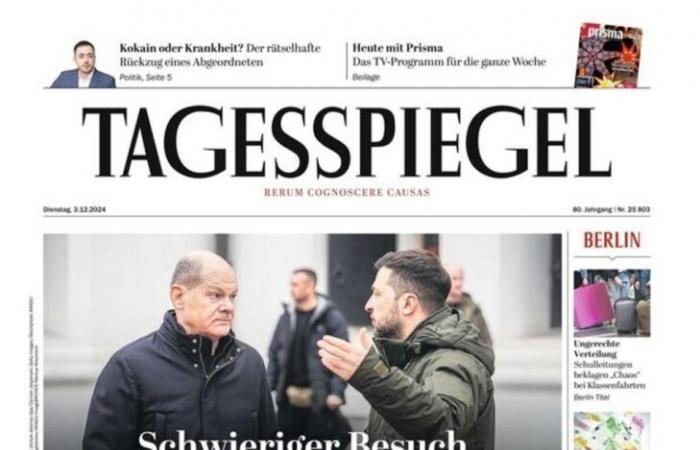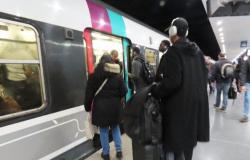AFP Videos – France
Ukraine: Scholz promises help, with the question of talks with Moscow in the background
Chancellor Olaf Scholz makes a surprise visit to kyiv on Monday, reaffirming his support and offering new aid to Ukraine, which views with suspicion his resumption of contact with Vladimir Putin and his idea of pushing the belligerents into negotiation. This unexpected trip of one day comes at a time when Ukrainian forces are retreating on the front and while the arrival in January of Donald Trump at the White House raises fears of a cessation of American aid to Kiev. It also comes a little more than two weeks later a telephone interview between the chancellor and the Russian president – their first since December 2022 -, criticized by the Ukrainian Volodymyr Zelensky. MM. Scholz and Zelensky are due to meet and speak to the press on Monday afternoon. His visit aims to “express” his “solidarity with Ukraine”, according to the chancellery. On the night before his arrival, Russia launched a new large-scale air attack against Ukraine, using around a hundred drones and leaving one dead and three injured in the town of Ternopil, in western Ukraine. Scholz's last visit was in June 2022, notably in the company of French President Emmanuel Macron, a few months after the start of the Russian invasion in February 2022. Olaf Scholz announced on his arrival in kyiv on Monday additional military aid of 650 million euros, which will be delivered as soon as the month of December. Ukraine, lacking men and weapons, is in dire need of support, with the Russian army accelerating its advances, particularly in the East. Since the Russian invasion, Germany has been the second largest supplier of military aid to kyiv, after the United States, and intends to “remain Ukraine's main support in Europe”, according to the German leader.- “Survival” of Ukraine -But despite repeated requests from kyiv, the chancellor has tirelessly refused to provide Kiev with longer-range Taurus missiles in order to avoid, he says, an escalation with Moscow. A position which should not change, now that Vladimir Putin threatens to strike Western countries authorizing the use of such missiles, namely the United States and the United Kingdom. Another point of disagreement between kyiv and Berlin is NATO. While the Ukrainian president again demanded this weekend an invitation to join NATO “necessary for the survival” of Ukraine, Germany is one of the allies which consider this approach premature. Volodymyr Zelensky assured Sunday that his country needed more weapons and security guarantees from NATO before possible negotiations with Russia. The Kremlin told him have no particular “expectations” regarding Scholz's visit to kyiv, but, conversely, once again welcomed the resumption of dialogue between the chancellor and Mr. Putin in mid-November, at the initiative of Berlin. – “Satisfaction” of the Kremlin – “I would not say that we have any expectations regarding this visit”, declared to the press the spokesperson for the Russian presidency, Dmitry Peskov, “but we would like to reiterate our satisfaction the fact that recently there was a first contact in a long time between the president and the chancellor.” President Zelensky then accused Mr. Scholz of opening a “Pandora's box” by speaking with Mr. Putin, kyiv fearing that the allies, tired of the conflict and intimidated by Moscow, will finally push Ukraine into territorial concessions, granting a military and geopolitical victory to Moscow. Especially since the uncertainty regarding American support for Ukraine with the return at Donald Trump's White House in January, fueled calls to begin negotiations. At the same time, Moscow and kyiv are intensifying their air attacks, Ukraine now having the right, since Russia received the alleged support of several thousand soldiers North Koreans, to strike in Russia with American ATACMS and British Storm Shadow missiles, projectiles with a range of a few hundred kilometers to strike the rear of the Russian army. The Kremlin launched an experimental hypersonic missile on a Ukrainian city , threatened to strike Europe and the United States, and relaxed the conditions for the use of nuclear weapons. Moscow is also increasing its bombing of Ukrainian energy infrastructure as winter sets in. On the Eastern Front, the advances of the Russian army have accelerated to an unprecedented level since the very first weeks of the war. On the domestically in Germany, Olaf Scholz has been a weakened leader since the collapse of his coalition in November. He is trying to pose as chancellor of peace, advocating a policy of restraint in Ukraine, to try to catch up in the polls against the conservatives, considered more hawkish, before the anticipated legislative elections on February 23.bur-pyv-alf /bur/






